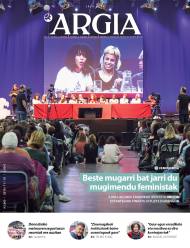Strategy
All public administrations in the Basque Country, and of course the Basque Government, use digitalisation as the axis of their industrial strategy. The research on which it is based is also geared towards digitalisation as advanced as possible.
Basque cultural and cultural activity also has its point of view in digitalisation and historical research fulfills that objective. Although the objectives are similar, for the management of the manufacturing industry Economic Development and Infrastructures or departments with a similar title are used, and for linguistic and cultural management departments with a similar denomination or Culture and Linguistic Policy are used.
Of course, the budgets of the two sections have nothing to do with it, although it is always claimed that the manufacturing industry and the language and culture should be inseparable elements of the Basque Country brand and, therefore, the strategies of both should be crossed.
In recent times, there has been an exponential jump in research in Euskera, thanks, on the one hand, to the automatic translator between Euskera and Castilian, and on the other hand, to the improvement of the transcription techniques in Euskera.
In recent times, there has been an exponential jump in research in Euskera, thanks, on the one hand, to the automatic translator between Euskera and Castilian, and on the other hand, to the improvement of the transcription techniques in Euskera.
If we were able to extend the Basque translator to English, French and other languages, that is, if we were able to hear what was said in Basque in other languages and the opposite, our manufacturing industry could work in Basque, and if it were exported elsewhere, the robots would translate what they had to translate into any language.
One of the initiatives of Euskaraldia in 2020 will be that the associations try to get closer to Euskera. As more and more people in our industry are able to speak or understand Euskera, real policies have to be added to voluntary policies; and in the case of Euskera, the jumps we have just mentioned are an unbeatable opportunity to deal with the resources and status of the manufacturing industry.
In fact, we must not forget that the rest of the languages are in an advanced process of intercommunication, and that if this train is lost, in a few years’ time, those of us who want to live in Basque will have to live further than it is now.
For example. Suppose you call us on the phone and speak to us in Spanish. If technology allowed us to hear in Basque what we've been told in Spanish, we'd be closer to living in Basque, right? In order to proceed along this road, it must be provided with the same resources as the manufacturing industry.
Bidali zure iritzi artikuluak iritzia@argia.eus helbide elektronikora
ARGIAk ez du zertan bat etorri artikuluen edukiarekin. Idatzien gehienezko luzera 4.500 karakterekoa da (espazioak barne). Idazkera aldetik gutxieneko zuzentasun bat beharrezkoa da: batetik, ARGIAk ezin du hartu zuzenketa sakona egiteko lanik; bestetik, egitekotan edukia nahi gabe aldatzeko arriskua dago. ARGIAk azaleko zuzenketak edo moldaketak egingo dizkie artikuluei, behar izanez gero.
Jakina da lan ikuskariak falta ditugula geurean. Hala ere, azken egunotan datu argigarriak ematea lortu dute: lan ikuskaritzaren arabera, EAEko enpresen %64ak ez du ordutegien kontrolean legedia betetzen. Era berean, lehendakariordeak gaitzetsi du, absentismoaren eta oinarrizko... [+]
Martxoaren 8a hurbiltzen ari zaigu, eta urtero bezala, instituzioek haien diskurtsoak berdintasun politika eta feminismoz josten dituzte, eta enpresek borroka egun hau “emazteen egunera” murrizten dute, emakumeei bideratutako merkatu estereotipatu oso bati bidea... [+]
Trumpen itzulera pizgarri izan da sendotuz doan eskuin muturreko erreakzionarioen mugimenduarentzat. Izan ere, historikoki, faxismoaren gorakada krisi ekonomikoekin lotuta egon da, baita sistemaren zilegitasun politiko eta ideologikoaren krisiarekin ere. Gaur egun, geldialdi... [+]
Batzuendako, dirutza izatea ez da nahikoa, eta euren ego hauskorrek diruaren txintxina ez ezik, protagonismoa ere eskatzen dute. Aberats okituak izatea nahikoa izango ez balitz bezala. Beti gehiago behar dute, anbizioa deritzote antsia horri, baina botere gosea eta nabarmendu... [+]
Bi neska komisarian, urduri, hiru urtetik gora luzatu den jazarpen egoera salatzen. Izendatzen. Tipo berbera agertzen zaielako nonahi. Presentzia arraro berbera neskek parte hartzen duten ekitaldi kulturaletako atarietan, bietako baten amaren etxepean, bestea korrika egitera... [+]
Iragan urtarrilaren hondarrean, Bretainiako lurraldeko bi hizkuntza gutxituei buruzko azken inkesta soziolinguistikoaren emaitzak publiko egin zituzten bertako arduradunek. Haiek berek aitortu zuten harriturik gertatu zirela emaitzak ikustean. Hain zuzen ere, egoerak eta... [+]
Silicon Valley-ko oligarkia AEBetako gobernura iritsi berritan lehertu da adimen artifizialaren (AA) burbuila. Txip aurreratuen erraldoia den Nvidia-k urtarrilaren amaieran izandako %16,8ko balio galera, egun bakar batean inoiz izan den burtsa balio galerarik handiena da... [+]
Gizakiok berezkoa dugu parte garela sentitzeko beharra. Parte izateko modu hori jasotako hezkuntza, ingurua... formateatzen joaten da.
Identitateak ezinegon asko sortzen du gizakiongan. Batzuetan, banaketak ere eragiten ditu, ezin dugulako jasan beste baten identitatearen... [+]
Fermin Muguruza jarraitzen duzu sareetan. Madrilgo kontzertuko bideo bat ikusi duzu bere kontuan: dantzari batek “Kongo askatu!” oihukatu du, bandera esku artean. Haren profila bilatu duzu: @c.kumaaa. Bilboko manifestazioaren deialdia zabaldu du. Ez zara joango,... [+]
Sare Herritarrak antolatuta, pasa den urtarrilaren 11n Bilboko kaleak bete zituen manifestazio jendetsuaren ondoren, berriz sortu da eztabaida, euskal presoei salbuespen legeriarik aplikatzen ote zaion. Gure iritzia azaltzen saiatuko gara.
Espetxe politikan aldaketa nabarmena... [+]
Duela gutxi think tank izateko jaioa omen den Zedarriak bere 6. txostena aurkeztu zuen. Beren web orrialdean azaltzen dutenaren arabera, zedarriak ebidentea ez den bidea topatzeko erreferentziak dira. Hots, hiru probintzietako jendarteari bidea markatzeko ekimena. Agerraldi... [+]
The time has come for us to enrol in schools in the Basque Country for the 2025-26 academic year, and in many homes the youngest of the household will take a new step soon, in September, which is schooling. Proud of the Basque Public School The members of Topagune are firmly... [+]
Since the adoption of the new Education Law for Álava, Bizkaia and Gipuzkoa, we are hearing/reading again and again that education will be free from now on. We have listened to different actors, including the Department of Education, and in the interviews we offer to the media,... [+]
At the beginning of the month he did III. Congress in Pamplona. It is said to be the “ordinary congress” that serves to draw “non-ordinary conclusions”, or at least that is how they have received Zutunik in the paper, proposed by the leadership and unanimously approved... [+]



















